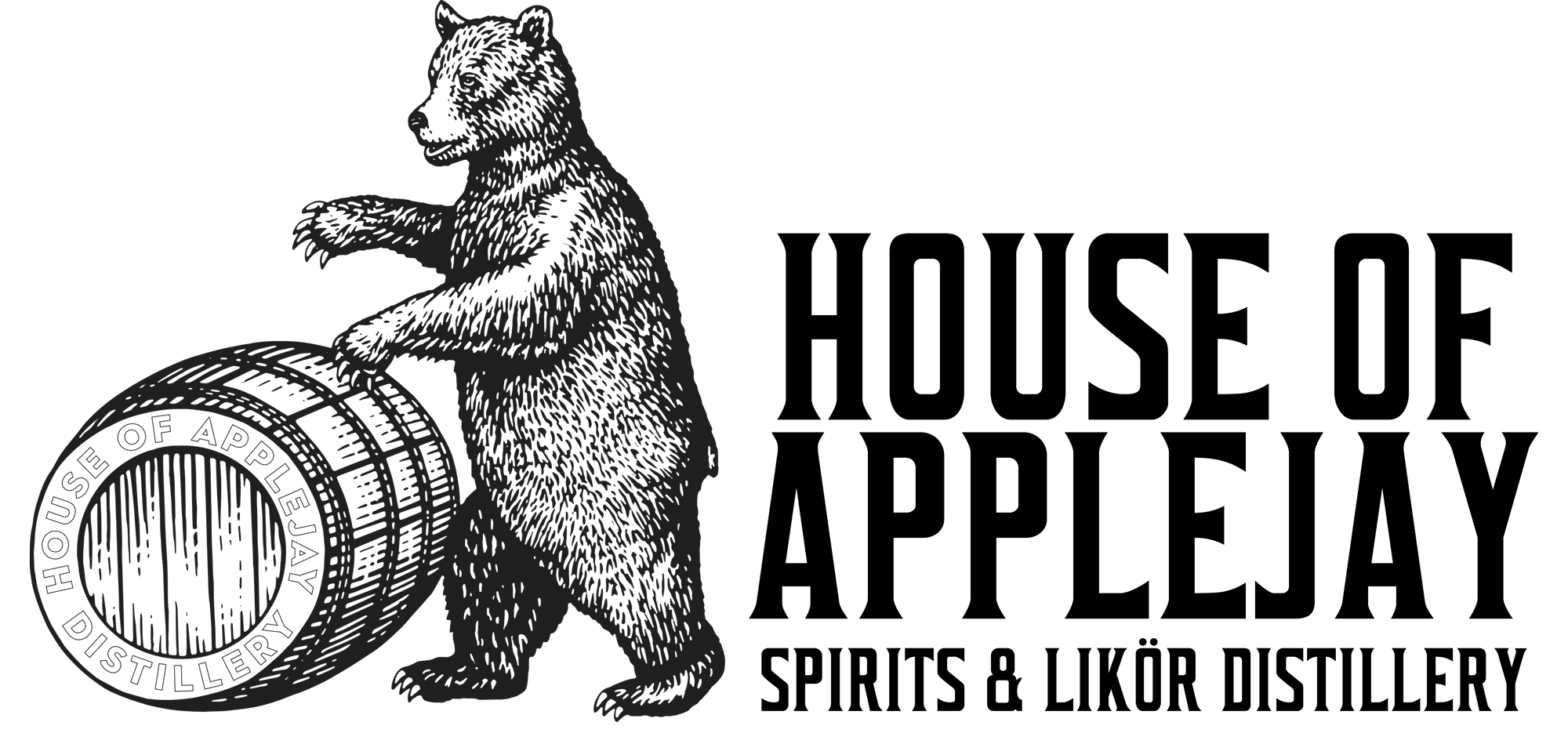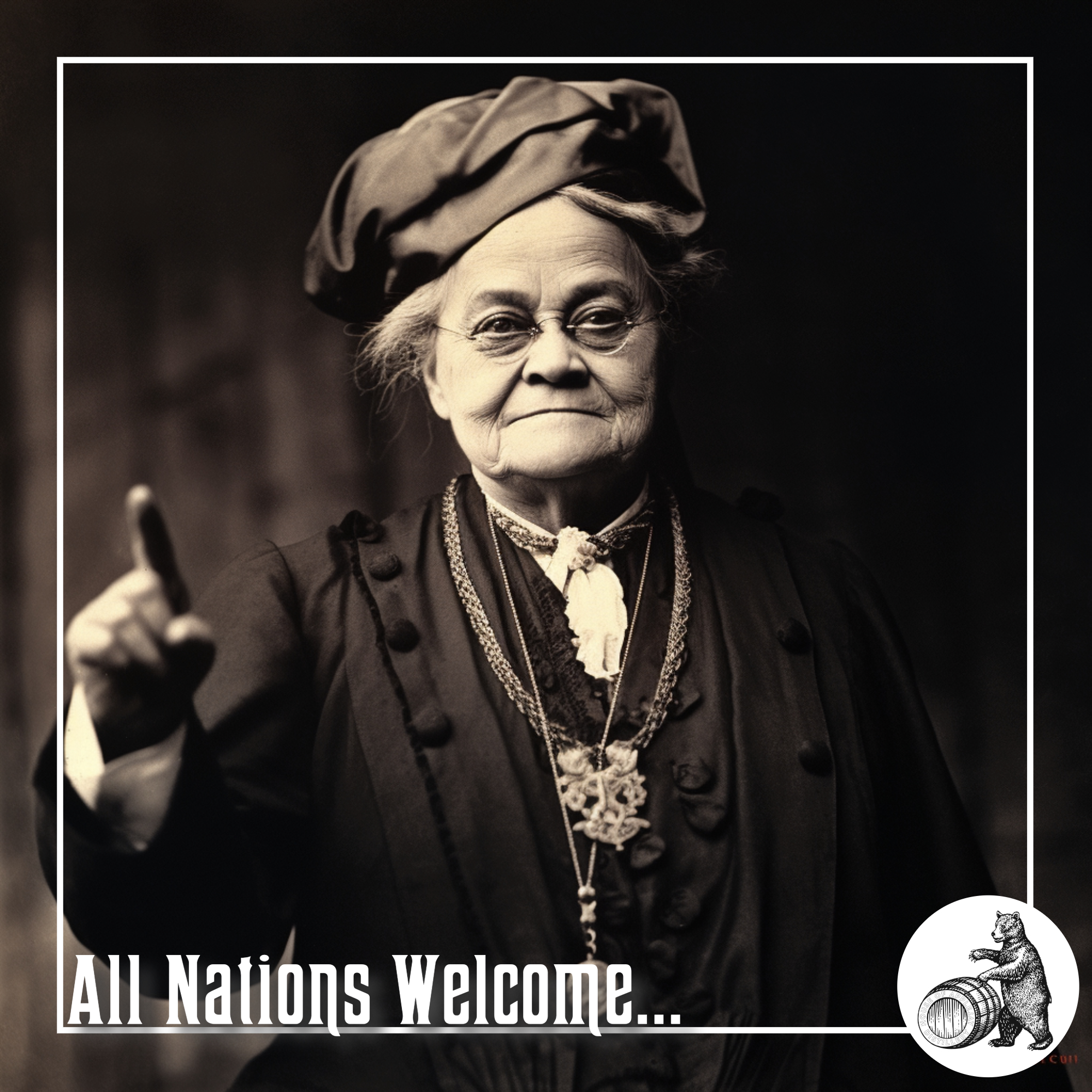All Nations Welcome Except Carrie
The Hatchet Granny:
Carrie Nation’s Crusade Against Saloons
Carrie Amelia Nation (1846 -1911) was an American activist mainly in Kentucky, Kansas, Oklahoma and Missouri. She was best known for her passionate advocacy within the temperance movement and her fervent campaign against alcohol consumption. Born in Garrard County, Kentucky, on November 25, 1846, Nation’s life was marked by a series of events that fueled her dedication to the prohibition cause.
Early activism
Carrie’s early years were characterized by hardship and personal challenges. She experienced the tragic loss of her first husband, Charles Gloyd, to alcoholism shortly after their marriage. This deeply traumatic event profoundly influenced her perspective on alcohol and set the stage for her later activism. Following Gloyd’s death, she married David Nation in 1877 and moved to Texas.
It was in Kansas, however, where Carrie Nation’s activism would truly take root. The state had implemented prohibition in 1880, but lax enforcement allowed the flourishing of illegal saloons. Frustrated by the lack of adherence to the law, Nation decided to take matters into her own hands. In 1899, she became a prominent member of the Woman’s Christian Temperance Union (WCTU) and went on to organize the local branch in Kansas. The WCTU was a key player in the temperance movement, advocating for the abstinence of alcohol and the promotion of social and political change.
She campaigned for compliance with state liquor laws, and was a proponent of women’s suffrage. Carrie opposed alcohol and promoted the idea of Prohibition in America. Nation’s approach to temperance activism was radical and attention-grabbing.
The Home Defenders
In 1880, alcohol was prohibited in Kansas, but the law remained unenforced. This prompted Carrie to personally enforce the prohibition. The movement gained momentum in December 1894 when she and a group of like-minded women, identifying as “Home Defenders,” initiated a raid on the local pharmacy in Medicine Lodge, Kansas. Discovering a barrel of whiskey, they rolled it out into the street and set it ablaze. Subsequently, in the ensuing years, the group targeted numerous bars and liquor-selling establishments across the entire state.
Hatchet Granny
She gained notoriety for her unconventional methods, including praying, singing hymns, and wielding a hatchet during her attacks on saloons. Her confrontational and controversial tactics earned her the nickname “Hatchet Granny.” In her view, destroying bars and liquor establishments was a righteous act in the fight against the perceived evils of alcohol.
Carrie Nation’s actions often led to legal consequences, and she was arrested numerous times for her “hatchetations.” Nevertheless, her bold and flamboyant approach garnered significant attention and support, making her a figurehead for the temperance movement. She capitalized on her fame by using it as a platform to promote her broader political ideas, including women’s suffrage.
The Carey House Hotel Bar
In December 1900, the women embarked on a mission to obliterate the opulent bar at the Carey House Hotel in Wichita, Kansas. This marked the inaugural use of a hatchet by Carrie, an act that would subsequently become the emblematic symbol for the prohibition movement. The anecdote narrates that Carrie’s husband jestingly suggested the use of a hatchet to intensify the impact. In the ensuing years, she continued her campaign, launching attacks on saloons across Kansas, resulting in her arrest approximately 30 times for what became known as “hatchetations.” The women, in their fervent pursuit, entered saloons with a rhythmic march, singing and praying while wielding bats and/or hatchets to shatter bar fixtures and bottles. Carrie’s infamous saloon-smashing crusade catapulted her to fame, and she astutely utilized her public image to promote her political ideals.
The Guthrie Saloon
In a Guthrie saloon in Oklahoma, an intriguing incident unfolded when saloon owner Moses Weinberger extended an invitation to Carrie Nation to speak at his establishment, humorously named the “Same Old Moses Saloon.” However, in exchange for the privilege of addressing the patrons, Carrie had to commit to refraining from any hatchet swinging, sparing Weinberger’s place from potential destruction. Despite her initial pledge, temptation got the better of Carrie upon her departure, leading her to swing her hatchet and carve out a lasting scar on the Mahagoni bar.
Seizing the opportunity, Weinberger cleverly utilized this incident to promote the event, hanging a sign that declared, “All nations welcome—Except Carrie.” This slogan quickly gained popularity and was replicated across all of Weinberger’s saloons. Notably, a neighboring establishment in Lawton, Oklahoma, even erected a billboard-size sign featuring the same message. In the subsequent years, this slogan became a prevalent fixture in saloons, serving as a reminder to guests of their privilege to enjoy their libations without the presence of Carrie Nation.
Carrie Nation’s life came to an end on June 9, 1911, just a year before the ratification of the 19th Amendment, which granted women the right to vote. She did not live to witness the onset of Prohibition in 1920. Despite the controversy surrounding her methods, Nation’s legacy endures as a symbol of unwavering commitment to social and moral causes, particularly the fight against alcohol consumption in early 20th-century America.
The Distilling Culture
BLOG
Embark on a global journey, and you’ll find that cultures possess tales that harken back to their ancient beginnings of distillation, brewing, and winemaking.
info@houseofapplejay.com
67 Fowler St, Bldg B, East Ellijay, GA 30540

